Danger Pay
WORKING AT A SOUTH INDIAN BPO: TAKE ONE
I learned something very important down in Brazil: what we conceive of as normal business practice in Canada and the US is not normal for the rest of the world. The high stress, fast paced world we know and love/hate is really rather unusual. A lot of the rest of the world doesn't just do things differently than we do, they actually often find us needlessly uptight, overwound, and tiresome.
That lesson has only been underlined so far in India... with a big thick black sharpie marker. Not only is keeping to any sort of schedule a foregone conclusion, but having people show up at all is nothing short of a miracle. I've learned some more things since starting work down here:
Lession 1: The value of unions.
There is no unions in the call centres.... yet. It shows. There aren't many unions in all of India. That shows too. There are a lot of people vying for jobs that pay as well as call centre work pays, and that shows too. This job means a lot for the people who are training. It means a salary that will support their whole family. When the employee is a young woman who was told she'd never need to finish school and braved on anyway, or another (true story) who adopted her cousin's child when the child's mother died in childbirth even though it would mean that she was giving up her chance at a normal life, and would forever be be presumed to be a slut single mother who had slept around before marriage? Well yeah.. that means more than just a job, it means a life, and dignity and pride.
And that's wonderful that it becomes possible today, but it still shows. There really isn't much in the way of positive reinforcement in the workplace. Recognition is rare, reprimands are plenty. Last week, one of the new trainees had a customer who wanted to escalate. The agent handed off the call to one of her supervisors. The call was pretty brutal, and was escalated again to the other inhouse trainer. All-in-all it took about 45 minutes to resolve. The agent, the team lead and the trainer all missed their breaks. The team lead told the agent that she was buying both him and the trainer dinner. We thought it was a joke; it wasn't.
It's not totally unusual for people to get cuffed in the back of the head for doing something wrong. It's not very hard and it's not unless the thing is very wrong, but man is it startling to deal with. There have been a number of times where I have run interference on the floor. What do the agents say about all of this? Well, just that this company is a *fantastic* place to work, and that they are very excited to be on board. I asked one of them surrepticiously about the discipline one day and she tilted her head to one side and looked at me like something had gotten lost in the translation. When I clearly restated, she laughed and asked me what I meant. "The call centre is very positive, very friendly. It is not like some other places I have worked before."
So I guess terrible is relative.
Lession 2: Health and Safety is of no concern at all.
This is true not just in the workplace, but all over India. At the hotel one night, Theresa took a spill in the hallway because the staff had run cables across the hall, and taken great care to tape the cables down in the most inconspicuous and invisible manner possible, taping black cables down with black tape to the one black stripe of tile in the hall. So the normally flat floor she walked on everyday suddenly had an obstacle.
In the streets, traffic is a crazy mad place. There are no speed limits in Chennai, nor are there lanes in most places. Horns are used as voices on the road rather than warnings. "I am here." one horn says, "Approaching quickly" says another. Cars cut in front of bikes and swerve around motorists in the most harrowing of ways. The majority of vehicles on the road are: autorickshaws (known locally as tuk-tuks because of the puttering noise that their little diesel engines make)
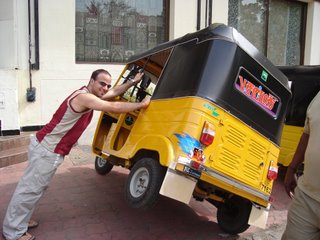
, older model cars like Ambassadors, Ashok Leyland style delivery trucks:
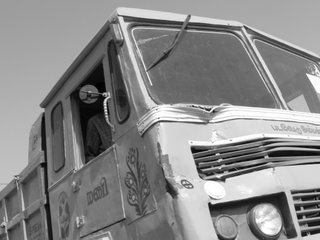
buses,
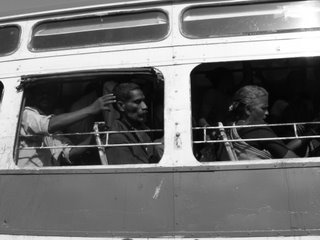
minivans, like the one that carry us to work and back
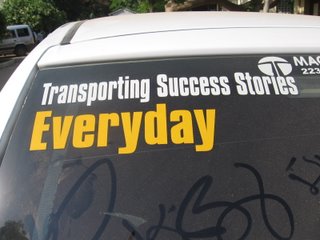
cows, bikecarts and bullcarts,
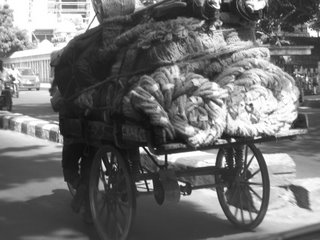
and a whack of crazy motorcycles and scooters, some of which carry way too much in the way of cargo...
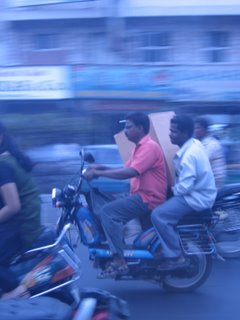
or, say, whole families of five, without a single helmet between them:
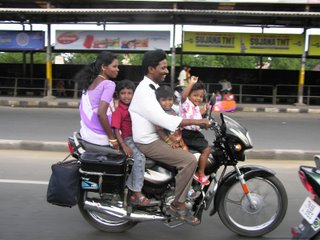
(As a side note, the women here astound me with their incredible balance. They ride everywhere on the back of bikes sidesaddle, sometimes without holding on to the driver or the bike, sometimes with a sleeping toddler pressed against them, sometimes dozing themselves in the noise and the chaos.)
Everything weaves in and out and speeds and slows. I have seen tuk tuk drivers keep their distance from other vehicles by sticking a foot out and resting it against the other vehicle to keep distance between. I have seen them utterly destroyed and discarded by the side of the road. Still, considering the madness, there are much fewer accidents than one would expect.
This carries over into work and hotel life too. In the first week we were here, we blew a fuse in the hotel room, and the maintenance man who came to fix the trouble tested to see if the outlet was dead by inserting a bare metal rod into the socket. I thought he might just be a crazy mofo, but since then I've seen about three other guys at home and at work try the same manoever.
At work, I have seen a fan, one that likely once terminated in a western plug, stripped at the end with it's two bare wires poking directly into the socket for power. I've watched the guys on the worksite accross from my building set up crazy scaffolding of trunks and planks to start the new floor of construction.
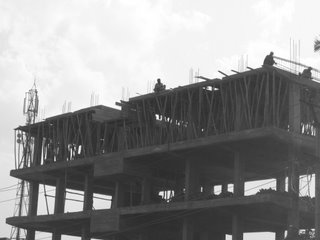
It's a zoo... and it still works, and I've yet to see anybody hurt from it. It's like the Indians laugh... nay chortle... in the face of death. Actually, it's less that they laugh and more like they give it no mind at all.
To be continued....
I learned something very important down in Brazil: what we conceive of as normal business practice in Canada and the US is not normal for the rest of the world. The high stress, fast paced world we know and love/hate is really rather unusual. A lot of the rest of the world doesn't just do things differently than we do, they actually often find us needlessly uptight, overwound, and tiresome.
That lesson has only been underlined so far in India... with a big thick black sharpie marker. Not only is keeping to any sort of schedule a foregone conclusion, but having people show up at all is nothing short of a miracle. I've learned some more things since starting work down here:
Lession 1: The value of unions.
There is no unions in the call centres.... yet. It shows. There aren't many unions in all of India. That shows too. There are a lot of people vying for jobs that pay as well as call centre work pays, and that shows too. This job means a lot for the people who are training. It means a salary that will support their whole family. When the employee is a young woman who was told she'd never need to finish school and braved on anyway, or another (true story) who adopted her cousin's child when the child's mother died in childbirth even though it would mean that she was giving up her chance at a normal life, and would forever be be presumed to be a slut single mother who had slept around before marriage? Well yeah.. that means more than just a job, it means a life, and dignity and pride.
And that's wonderful that it becomes possible today, but it still shows. There really isn't much in the way of positive reinforcement in the workplace. Recognition is rare, reprimands are plenty. Last week, one of the new trainees had a customer who wanted to escalate. The agent handed off the call to one of her supervisors. The call was pretty brutal, and was escalated again to the other inhouse trainer. All-in-all it took about 45 minutes to resolve. The agent, the team lead and the trainer all missed their breaks. The team lead told the agent that she was buying both him and the trainer dinner. We thought it was a joke; it wasn't.
It's not totally unusual for people to get cuffed in the back of the head for doing something wrong. It's not very hard and it's not unless the thing is very wrong, but man is it startling to deal with. There have been a number of times where I have run interference on the floor. What do the agents say about all of this? Well, just that this company is a *fantastic* place to work, and that they are very excited to be on board. I asked one of them surrepticiously about the discipline one day and she tilted her head to one side and looked at me like something had gotten lost in the translation. When I clearly restated, she laughed and asked me what I meant. "The call centre is very positive, very friendly. It is not like some other places I have worked before."
So I guess terrible is relative.
Lession 2: Health and Safety is of no concern at all.
This is true not just in the workplace, but all over India. At the hotel one night, Theresa took a spill in the hallway because the staff had run cables across the hall, and taken great care to tape the cables down in the most inconspicuous and invisible manner possible, taping black cables down with black tape to the one black stripe of tile in the hall. So the normally flat floor she walked on everyday suddenly had an obstacle.
In the streets, traffic is a crazy mad place. There are no speed limits in Chennai, nor are there lanes in most places. Horns are used as voices on the road rather than warnings. "I am here." one horn says, "Approaching quickly" says another. Cars cut in front of bikes and swerve around motorists in the most harrowing of ways. The majority of vehicles on the road are: autorickshaws (known locally as tuk-tuks because of the puttering noise that their little diesel engines make)

, older model cars like Ambassadors, Ashok Leyland style delivery trucks:
buses,
minivans, like the one that carry us to work and back
cows, bikecarts and bullcarts,
and a whack of crazy motorcycles and scooters, some of which carry way too much in the way of cargo...
or, say, whole families of five, without a single helmet between them:
(As a side note, the women here astound me with their incredible balance. They ride everywhere on the back of bikes sidesaddle, sometimes without holding on to the driver or the bike, sometimes with a sleeping toddler pressed against them, sometimes dozing themselves in the noise and the chaos.)
Everything weaves in and out and speeds and slows. I have seen tuk tuk drivers keep their distance from other vehicles by sticking a foot out and resting it against the other vehicle to keep distance between. I have seen them utterly destroyed and discarded by the side of the road. Still, considering the madness, there are much fewer accidents than one would expect.
This carries over into work and hotel life too. In the first week we were here, we blew a fuse in the hotel room, and the maintenance man who came to fix the trouble tested to see if the outlet was dead by inserting a bare metal rod into the socket. I thought he might just be a crazy mofo, but since then I've seen about three other guys at home and at work try the same manoever.
At work, I have seen a fan, one that likely once terminated in a western plug, stripped at the end with it's two bare wires poking directly into the socket for power. I've watched the guys on the worksite accross from my building set up crazy scaffolding of trunks and planks to start the new floor of construction.
It's a zoo... and it still works, and I've yet to see anybody hurt from it. It's like the Indians laugh... nay chortle... in the face of death. Actually, it's less that they laugh and more like they give it no mind at all.
To be continued....



3 Comments:
This brings back a lot of memories of Indonesia. The traffic (including families on motorcycles), the hand-built scaffolding (ten stories of bamboo), and all that craziness.
And that attitude of, 'What do you mean dangerous? It's always worked fine for us.' Of course it turns out that it is more dangerous, as more than one person we knew in Indonesia was seriously injured (and one was killed) in the chaos.
I don't know whether to be sad that they live dangerously, or glad that they don't let it bother them. I guess I'm both...
I saw a very interesting documentary on call centres in India a few years ago. I think it is called "India Calling", but I may be wrong. Anyway, it seems like something you'd relate to a lot in your present position. Though remembering it can still depress me at times.
Bombay Calling? I think India Calling is an Indian soap opera set in a Call Centre. We saw this very interesting one before coming.
It's kind of a an astounding thing to be watching, a cultural revolution happening before your very eyes. Sometimes I worry what westernization will do to the traditional culture of India, sometimes I revel in it... In the end it comes down to that whole mix of terrible and beautiful. I'm not sure I'll ever really decide one way or the other.
Post a Comment
<< Home